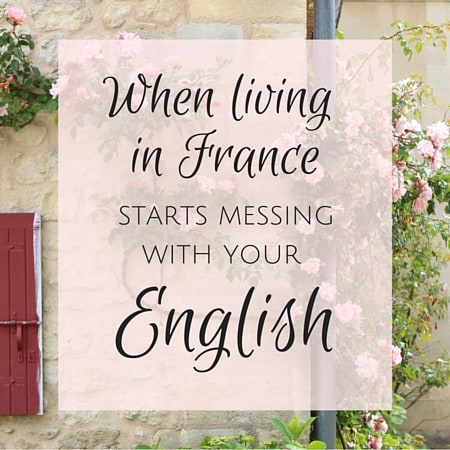Living in France since 2012 has taught me more than I could have ever imagined. I’ve learned tons about myself, my ability to adapt. I’ve learned a new language, how to thrive in a new culture and so much more. Those are pretty serious aspects of moving to a foreign country, but there are some lighter consequences of moving abroad too and that’s what I’ll be getting into here.
Believe it or not, living in France has actually expanded my English vocabulary. Here are a bunch of British English words I didn’t know until I moved to France. Yup, I’ve expanded my English language lexicon living in France. I hope my UK readers get a kick out of this!

Credit: Depositphotos.com/ischukigor
As you read this post, you’ll either have a good chuckle or you’ll just think I’m an idiot. Maybe both. I hope just the former. :-)))))
While living in the U.S., just to give you some context, I didn’t know many British people beyond a few casual acquaintances over the years. I wasn’t into any British TV shows at the time, so my ear didn’t get much practice with any of the UK accents. But these days, that’s all changed and my English vocabulary has majorly opened up.
Something to keep in mind is that worldwide audiences are very familiar with American English and our accent due to Hollywood’s pervasive influence. People everywhere hear our accent and slang in films and on TV shows. But for me to hear a Geordie accent, a Scottish one, or a Northern Irish accent, well that would be rare. Even living in New York City, I didn’t regularly encounter these accents.
I can only speak for myself here and while I don’t have any scientific stats, I’d bet that most Americans aren’t overly familiar with the British English words below. I’ve done an informal poll with family members and friends across age ranges and geography and the ones who knew the words below had a specific reason to (British friends, spouse, lived in the UK, etc.)
I’ve also met British folks who’ve needed an explanation of the American term I had used, so it goes both ways.
First, why has moving to France taught me some British English? There are a few reasons:
1. I learn British English words when I look up French translations
I use my French/English translator app multiple times per day every day. I always come across words I’m not familiar with in French, so I try to immediately look them up and commit them to memory (which works about half the time, the remembering part).
When I look up the word, the English translation often has a couple of options, as shown in my above photo. Let’s take the word coffre, in French, which means trunk (among other things). When I look it up, I see that the UK word is boot. I’ve learned so many UK words this way.
2. Creating Oui In France + work I’ve done. My blog, social media, and YouTube channel all put me in contact with way more British people than if Oui In France didn’t exist. While my majority audience is American, I have a solid British following and your emails and comments have taught me so much. If I don’t know the word, I look it up and I’ve learned many over the years.
Also, the type of work I do puts me in contact with a more international audience than my job back in the U.S. My former boss was British so I’d hear more UK-isms than usual.
3. TV shows/movies/podcasts. This reason has nothing to do with living in France specifically, but I love British TV shows, especially police and detective ones. I’m watching Shetland at the moment and it’s set in Scotland. GREAT accent! But it’s one I admit I had a lot of trouble with when I visited with my family several years back.
French words that sound super formal in English >>
Here are the British English words that have stood out to me the most and popped right into my head when I sat down to write up a list. What British words don’t Americans understand in your experience?
British words Americans don’t know (just me?):
Jumper. We’d call this a sweater in American English. A jumper to me would be someone who jumps or a completely different clothing item and more of a sleeveless dress that goes over something else.
Torch. This is just a regular old flashlight, like a battery-operated light for when the power goes out. Very normal to have around the house. I was so confused why our British Airbnb host a few years back was looking for a “torch” when he had to go in the basement. Wouldn’t a flashlight work fine? DOH! It IS a flashlight.
P.S. Can a British person tell me what you’d call a torch then? You know the stick with a big flame on top, like the ones that are snuffed in the Survivor elimination rounds?
Fancy dress. I learned this one from a British YouTuber I watch. She was telling us a funny story about a convo she had with an American about wearing fancy dress to a party. The American showed up in literal evening wear. Fancy dress just means a costume, like a Halloween costume, nothing to do with formal attire. I have no idea what a costume would mean to a British person. Let me know please? Merci.
Scheme. Scheme has a bit of a negative connotation in American English. Someone who is scheming is up to no good. You also hear scheme used after the word pyramid and pyramid schemes are scammy as heck. That’s why it took a little while for me hearing scheme used in British English to realize it’s a neutral term that’s synonymous with program.
A government scheme isn’t anything nefarious in the UK (but a scheming government in the U.S. would be bad). It’s just a government program. Whenever I’d hear a British person use the word scheme, I thought it was a negative thing and was confused for a long time. Ooops.
You’re a star. I first heard this one at an international work event I attended on behalf of my client. I was approached by a British guy one day who needed help with something. After I gave him the info he needed, he told me with a smile, “Diane, you’re a star.” I smiled and said oh wow, thanks, glad I could help you out! It sounded so special and sincere. I WAS A STAR!
I think two years passed before I realized the British saying “you’re a star” is actually not that specially. It’s used in the same way we’d use “you’re awesome” or “that’s great.” Pretty generic. Damn, I thought he was really happy with my help!
Niggle. The first time I heard niggle, I thought the person was saying nickel and couldn’t figure it out. It just means an annoyance or something causing discomfort. Like if you worked out a bit hard yesterday and now your knee is bothering you, you could say it’s a niggle. Or you have a niggling problem. One of my favorite Peloton instructors says this one a lot.
Now to redeem myself, here are some pretty commonplace British English words I already knew (and maybe most Americans know?):
-knackered is really tired
-loo is toilets
-boot is a car trunk
-lift is an elevator
-holiday is a vacation
-chuffed is happy
-nick is to steal (and also my cousin’s name)
-dodgy is suspicious
-chemist is a pharmacist (what do British folks call a chemist then?)
Some you can pick up from context. I learned plaster (Band-Aid) this way along with nappy (diaper) and trolley (shopping cart).
Something else that’s funny is although I speak with an American accent, I sometimes slip British-isms into whatever I’m saying. I’m sure it sounds weird. I’ve hesitated before saying something like “My family is going…” in favor of the British ” my family ARE going.” Family is a singular noun in American English but plural in British English (maybe elsewhere too?). I hear it all the time on podcasts and shows. But with an American accent, it just sounds like poor grammar, so I try to keep it American when it comes to singular vs. plural noun conjugation conventions.
***
Anyway, I find the topic of linguistics fascinating and that language is a fluid concept. I probably would have studied linguistics in college if I hadn’t gone the communications route.
Let me know if moving abroad or another life change has resulted in you learning even more words in your mother tongue. If you’re British, what American words and phrases tripped you up?
PIN IT:








Bonjour Diane! I get messed up with the singular and plural nouns too, so I stick to the American way. “My family IS going on holiday so we have packed everything in the boot.” I love the word holiday — it just sounds more fun! Carrie in Paris
Just kindly take away faimo sil vous plait.
Diner doit etre tres bien et poulet avec pommes de terre.
Nestle cream expat English country cream in my coffee or tea tray with coffee cream and tolly chicken sandwiches or tolly tuna sandwiches Island School with non of my exemplary help in the serious and maintenant as Wilon would say, because chicken makes me stronger and tuna makes me weak, dahl totally unhelpful and sleeping.
Hi Diane. It’s Joe. What a cool post. You are so right about learning British words. I found that “straight away “ means “right away”, a “pint” means a draught beer, and a “lorry” is a truck. For me, you are so correct how much you learn about yourself while traveling and saturating yourself in the local culture and it’s day to day life. I traveled alone and managed to have a wonderful month going around France learning how to best use my spoken french, using the train system, transferring stations, using local buses in towns I’d never been to before, trying different foods, trying local shops and restaurants etc.
all while backpacking with minimal stuff. I selected lodgings that washers. I used the pharmacies, grocery stores and open air markets. The Tourist Info centers are a big help too.
I gained a great deal of satisfaction knowing I could do it even at 73. Im looking forward to my next visit to france.
Thank you for your support and for your continued efforts at educating your followers. Bientot, Josef.
Other important differences between US and UK English:
to table = to postpone discussion of a topic (US)
to table = to bring up a topic for discussion *now* (UK)
to revise = to change/edit (US)
to revise = to read again/review (UK)
Interesting! I didn’t know those!
I lived in another country for a little while and met lots of English speakers from around the world. We’d frequently play Scrabble, but we spent more time arguing than playing. The spellings were different, the meanings were different (or non-existent). But now I know immediately if someone is from South Africa or New Zealand from their accent. (I’m from the US). I also love linguistics. I know 2 and a half languages and am re-learning French right now.
Hhaha yes Scrabble would be quite tricky when people have all different spelling conventions. Great game though. Wishing you luck on your French journey. 😉
What a fun post. I love linguistics too. I am Dutch, learned (learnt) British English in school, then spent some time in the US and later married an American. Living in other foreign countries, I came across English speakers from all over, and enjoyed all the accents and different word usages. (We now we live in France.)
I get a kick out of learning how words travel and change meaning from language to language. The word coffre, you mentioned, for instance: The Dutch word koffer obviously has the same roots, and it means suitcase in English. Check out the word vest. In Dutch it’s a cardigan, veste in French means jacket, the American word vest is what the Brits call a waistcoat, the Italian word vestito means dress. You’d better love this stuff or go nuts learning languages 😉
Yes the vest one can be confusing. I can’t even imagine how complicated all this becomes when you add in Dutch to the mix!
The one that;s always confused me is “in hospital” where Americans say in THE hospital
Right, like we say going to church (no the) in the US so I understand where they’re coming from. We don’t say going to the church (in general). The British way makes sense for hospital since “the hospital” makes it sound like it’s a specific hospital.
My favorite mistake as a New Yorker living in London was learning what ‘suspenders’ means in British English. I was at a new job learning everyone’s names in the department and when someone mentioned the department head’s name, I asked if it was the gentleman in red suspenders. There was a moment of silence before everyone burst out laughing and someone explained that ‘suspenders’ means garter belts in British English. Needless to say, I never made that mistake again.
Oh boy, thanks for the heads up on that one. I will never say suspenders if I’m in the UK or talking to someone from there in a professional context. So funny!
If you ever do want to say suspenders, they’re called ‘braces’ in the UK.
OK, thank you, good to know! But what do you call the orthodontic treatment that Americans would call braces on the teeth?
Your French-English translator app looks really handy. Could you please publish the details? I‘d like one for German-English.
Thanks,
Robin
Hi it’s the free version of Word Reference
Thanks. Incidentally, German Duolingo teaches you American English as well as German. For example, apparently the English for “abwaschen” is not, as one would expect “Wash up”, but “do the dishes”. OK, I know “wash up” in AmE means to wash oneself. And you’d be surprised by how annoyed American users get by the German use of the 24 hour clock, e.g., 5pm = siebzehn (17) Uhr. Is this equally common in Frencg? (Just to get back on topic)..